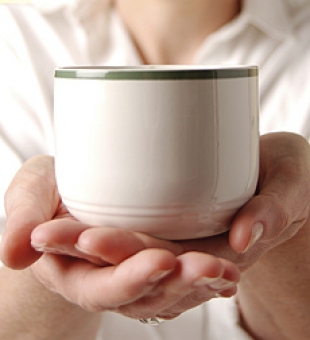Retreat leader Joyce Rupp uses an ordinary cup in short rituals designed to lead us to a deeper and richer spiritual life. Here is one from The Cup of Our Life: A Guide for Spiritual Growth:
"Hold the empty cup in your hands. Look at all the room the cup has for filling. Picture an inner part of yourself. Notice how much room there is for filling. Hold the cup out before you in the gesture of a beggar. Ask God to fill you."
Opening ourselves to God's grace is a practice that we should do every day. Perhaps instead of the cup ritual, you might use a prayer gesture such as holding your hands with the palms up or cupping your fingers around your ears as you ask God to speak to you today. These simple movements signal your willingness to trust in God's guidance. See how they feel compared to clenching your fists in anger or using your arms to indicate that you want to keep something away.
Another step to practicing openness is suggested by an old Zen story. A university professor goes to have tea with a teacher. The teacher pours the visitor's cup full and then keeps on pouring. The professor watches the overflow until he can no longer restrain himself. "It is overfull. No more will go in!"
The teacher responds: "Like this cup, you are full of your own opinions and speculations. How can I show you Zen unless you first empty your cup?"
All of us have filled our cups with preconceptions, expectations, prejudices, assumptions, and opinions. We think we already know what we need or where to find out what we need. But the spiritual life requires that we be open to God's messages coming from all directions and that we also be willing to change our minds.
We were once expounding to a friend about something that was happening in a relationship with a mutual acquaintance. "She's going to do this next and then that and then this will happen," we went on and on.
Our friend said simply, "You don't know any of that. The future is God's domain." By predicting another's behavior, we were limiting the range of behavior we would recognize. It's better not to have expectations and to allow ourselves to be surprised and blessed.
William Penn, the English Quaker who founded the Pennsylvania colony, points us to another aspect of openness. He prayed: "God help us not to despise or oppose what we do not understand."
God surely loves diversity. Look at the phenomenal range of peoples, cultures, plants, animals, stones, and stars in the universe. Humans differ from each other mentally, physically, emotionally, and spiritually. The challenge every day is to be open to the gifts packed within these differences and not to view them as threats.
In these times, when the world is so fragile and tense with the dark clouds of terrorism, when politicians are playing on divisions within the country to build up their support, and when economic and geographic factors separate us even more from others, it is good to remind ourselves of many spiritual leaders' fearless openness towards those who are considered outsiders, pariahs and rejects. Jesus, for example, modeled the great spiritual practice of keeping a heart open to others in love, kindness, compassion, and reverence.
You can see how you do with such an open-hearted approach by keeping a diary of your experiences. Religious leaders like John Wesley and Thomas Merton found this daily discipline enabled them to spot signs of God's presence and to also track their own shortcomings and accomplishments. As contemporary writer Doris Grumbach says: "Keeping a journal thins my skin. I feel open to everything, aware, charged by the acquisition of intensity."
